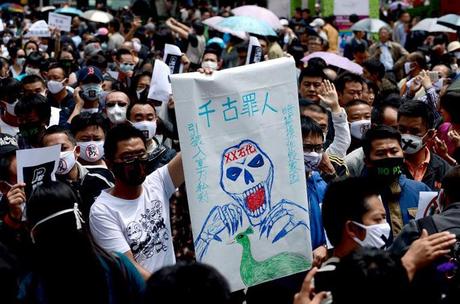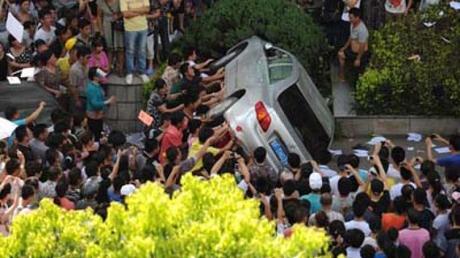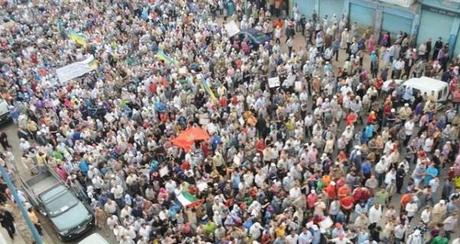
Kunming protests strike fear of revolution in Chinese authorities
By Sasha
The Chinese environmental movement is blowing up. There are major protests every week, often pertaining to long-running campaigns. And in spite of the Western media’s portrayal of the Chinese government as totalitarian and repressive, many of these campaigns appear to be winning.
Yesterday, a rally including hundreds of protestors took place in Kunming to stop construction of an enormous petrochemical complex. The hot-button issue is complex will produce paraxylene, a deadly carcinogen. While the rally ended peacefully, in spite of a wall of cops meeting the protestors, many of the rising protests in China do not.
Most recently, a court sentenced 16 protestors to prison time for “gathering to assault state organs, damaging property and theft” against a pipeline carrying waste from a local paper factory. Months after that action, the government cancelled the pipeline after more than a thousand protestors marched through the streets of Qidong, with several protestors splintering off, occupying the main government building, smashing computers, and throwing documents out of the windows to thundering applause from the protest below.

Qidong protestors overturned cars, and a planned pipeline
The historic Shifang protest against a copper plant last year also resulted in protestors occupying a government complex, overturning cars and starting trouble. The plant was cancelled soon after. In 2011, a similar mass mobilization led to the shuttering of a solar panel factory that was polluting the people and the land.
According to Phelim Kine, senior Asia researcher for Human Rights Watch, ”Citizens, particularly a rising Chinese middle class, have become more aware about how deep the impact of environmental issues is to their health.” While the Shifang protest was largely led by students, the Qidong campaign seems to have been more of a mass mobilization. But the environmental mobilizations are part of a national movement.
In 2010, 180,000 “mass incidents” were registered in China, and 65% of those were rural mobilizations against land grabs. In most cases those land grabs were for infrastructure, factories, mines, and other cases of industrial development. There is also a building “pro-democracy” movement that is joining with the rural and urban environmental movements. The confluence of land rights and ecology is registering in other places throughout the world, although “pro-democacy” can often be a front for the co-opting forces of liberal capitalism, it is important to recognize these struggles.
For example, the island-nation of Morocco rose up in revolt against a land grab by Korean multinational, Daewoo, which was planning on converting 1/3 of the country into a biofuel plantation. The revolution, which overthrew the country’s leadership in 2012, does not appear to be creating a radical new government, but it does show the potential for social organization and unity in the land-based struggle for liberation. We can also look to uprisings of specific groups, like native peoples in Peru who have successfully staved off land grabs in what has been a bloody and prolonged struggle (particularly since the US-Peru FTA in 2008, which led immediately to the infamous Bagua Massacre).

The revolution in Morocco is only the tip of the iceberg—struggles against the Global Land Grab can even be seen in the US and Europe, as industry interests in fracking, coal and uranium mining, oil extraction, deforestation, and so on, are becoming increasingly apparent. The accumulation of capital in the global economy, according to scholars such as Noam Chomsky and David Harvey, is increasingly devoted to land acquisition and resource extraction. The corruption within the finance sector, which crashed in 2008, is being compensated for by these large land grabs—a process that Harvey calls “the spacial fix.”
The resistance to capital and class war has become ecological. Solidarity with the Chinese environmental movement, and the struggles of all people (and species) to be free!

